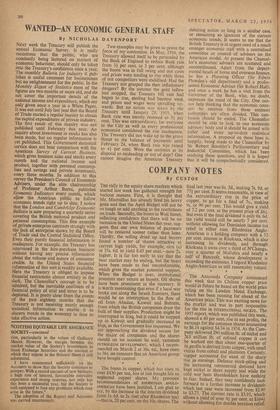COMPANY NOTES
By CUSTOS
THE rally in the equity share markets which started last week has gathered strength for various reasons. First, it is thought that Mr. Macmillan has already fired his heavy guns and that the April Budget will not be so tough or add anything to the restrictions on trade. Secondly, the boom in Wall Street, reflecting confidence that there will be no recession in the United States this year, sug- gests that our own balance of payments will be restored sooner rather than later. Thirdly, the selling dried up and buyers found a number of shares attractive at current high yields, for example, otis (A) at 35s. 6d. to yield 8.45 per cent. —now 2s. higher. It is far too early to say that the bear market may be ending, but the bears have been made to feel uncomfortable, which gives the market potential support. When the Budget is over, institutional investors may return as buyers. Oil shares have been prominent in the recovery. It is worth mentioning that even if a local war broke out along the Israeli frontiers, there would be no interruption to the flow of oil from Abadan, Kuwait and Bahrein, from which the British companies draw the bulk of their supplies. Production might be interrupted in Iraq, but it could be stepped up in Kuwait and gradually increased in Iran, as the Government has requested. We are approaching the dividend season for the major oil companies and the shares should on no account be sold. TRINIDAD PETROLEUM DEVELOPMENT, which I recom- mended on March 2 at 30s. 6d., have risen to 36s. on rumours that an American group have bought control.
The boom in copper, which has risen to over £430 per ton, has at last bought life to neglected copper shares. My previous recommendations of RHODESIAN ANGLO- AMERICAN have been justified, I am glad to say, by the increase in the interim dividend from ls. 6d. to 2s. (net after Rhodesian tax) —that is, 20 per cent. on the 10s. shares. The final last year was 6s. 3d., making 7s. 9d. or 77i per cent. It seems reasonable, in view of the extraordinary rise in the price of copper, to go for a final of 7s., making 9s. or 90 per cent. This would give a yield of 7.2 per cent. at the present price of £6+. But even if the final dividend is only 6s. 6d. the yield would still he nearly 7 per cent. without allowing for Dominion income tax relief in either case. Rhodesian Anglo- American is a holding company with a 52 per cent. interest in Rhokana, which is also increasing its dividends, and through Rhokana it owns over a third of N'Changa, over a quarter of Mufulira and nearly a half of Bancroft, whose development is exceeding the estimates. I regard Rhodesian Anglo-American as still reasonably valued.
The Anaconda Company announced this week that its Chilean copper price would in future be based on the world price ruling on the London Metal Exchange, which has been running far ahead of the American price. This was exciting news for the market and was in part responsible for the rise in INTERNATIONAL NICKEL. The 1955 report, which was published this week, showed a 40 per cent. rise in net profits, the earnings for the common shares amounting to $6.14 against $4.34 in 1954. As the Com- pany delivered 290 million lb. of nickel and 263 million lb. of refined copper it can he worked out that about one-quarter of its profits is derived from copper, with small extras from cobalt and platinum. Certainly, copper accounted for most of the sharp rise in earnings. Defence stock-piling and the increasing commercial demand have kept nickel in short supply and while the cold war lasts shareholders have nothing to fear. Indeed, they may confidently look forward to a further increase in dividends which last year were increased from $2.90 to $3.75. The current rate is $3.95, which allows a yield of over 4+ per cent. at $164:,'- without allowing for double taxation relief.


































 Previous page
Previous page